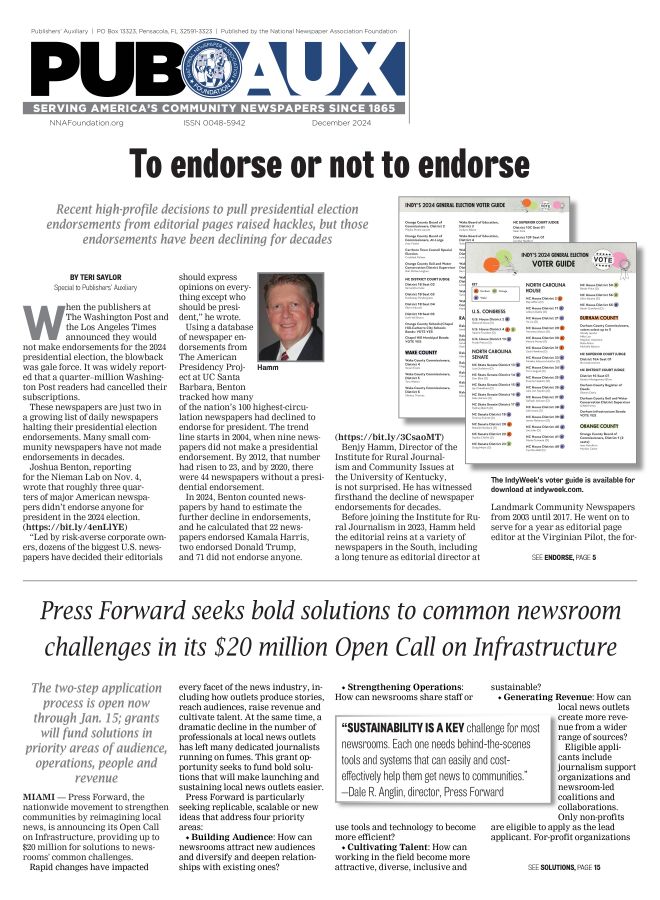Slow Mail Costs Money
Aug 18, 2017
By Matthew Paxton IV, publisher of The News-Gazette, Lexington, VA
and Immediate Past President of the National Newspaper Association
Most people get mail every day, Monday through Saturday. But what happens when the mail comes later than we expect?
We found out a few years ago, when the Postmaster General had to take away overnight First-Class and Periodicals mail from most of the nation. That caused a problem for a lot of consumers and businesses. Now, we may be facing a new slowdown, if something isn’t done by Congress very soon.
Who needs the mail, some people ask? We have the Internet now. But a lot happens in the mail, and a lot goes wrong when it is late. To begin with, mail is the backbone for about $1.3 trillion in jobs, products and services. And then there is the personal impact.
People send in their credit card payments at the last minute when cash is tight. The payment reaches the credit card company late, and credit scores take a beating. That causes loans for cars and houses to get more expensive.
Many people count on the mail for medicines. A missed dosage can mean a trip to the hospital.
Small businesses count on the day’s mail to bring in cash from customers. A few days’ delay can mean a trip to the bank for a loan. Loans cost money, and put pressure on the business to raise prices.
Some things just can’t be emailed. It is hard to send your grandkid’s birthday cake overnight by the Internet. Some farm supply houses use the mail to deliver small animals quickly. They certainly can’t zap them across broadband, or allow them to die in a post office waiting for a mail truck. And then there are legal documents that have to arrive by certified mail. Also, I have to mention late newspapers, where sales coupons are missed and public event announcements arrive after the event. Newspapers like this one that rely on the mail for delivery to readers took it on the chin the past few years, with disappointed readers canceling their subscriptions.
We are at another crunch point. The US Postal Service has a $57 billion deficiency on its balance sheet, most of it caused by Congress. Fixing it may require the Postmaster General to close more post offices and mail sorting plants, eliminate mail-hauling truck routes and ground the airmail. The mail would be slowed down even further.
USPS last received a major overhaul by Congress in 2006. The next year, Steve Jobs appeared on a stage with a new gadget called an iPhone. Since then, Congress and the Postmaster General have been grappling with the tough problem of collecting enough postage for a system that must reach ever more mailing addresses in America, but with less mail—though still important mail—to pay for the service. So far, Congress has done nothing but tinker.
This is nothing new. Since the birth of the nation, Congress bogged down many times in finding resources for this essential economic backbone—one of the few government services actually in the Constitution! Usually a slow Congress results in slower mail.
The choices are tough, and Congress is never good at tough choices. Businesses that buy postage cannot afford big increases and will simply find alternatives if the rates are jacked up too much. Consumers cannot afford to pay more for slower mail. USPS wants to protect jobs for its workers.
Of course, USPS is not supported by tax dollars, but by postage. And no tax-payer money should be needed unless Congress lets the system deteriorate further. There is a better choice.
A bill was sent to House Ways and Means Committee last March by the House committee responsible for overseeing the US Postal Service. The bill, HR 756, is now sponsored by Republican Rep. Mark Meadows of North Carolina, and three Democrats: Reps. Elijah Cummings of Maryland; Gerald Connolly of Virginia; and Stephen Lynch of Massachusetts. All are experts on postal matters. That this group, who agree on little else, could come up with a solution says a lot about this bill.
The legislation would require about 77,000 retired postal workers who draw benefits from a federal benefits health fund to use Medicare instead. Medicare taxes were already paid for these workers. The Medicare fund owes these retirees their benefits anyway. It is just that this group has chosen a different benefit for themselves, which they were allowed to do. Now it is time for them to follow the practice of most private sector workers and draw their earned benefits from Medicare instead.
Commercial mailers would have to accept a small postage increase to pay most of the new cost to Medicare. But the benefits to the federal budget and to USPS would be substantial. Overall, the federal deficit would be $6 billion less if the bill passed.
And the US Postal Service would save about $30 billion over 10 years. The rest of its red ink would have to erased through new efficiencies, and many steps have already been taken to find those, without creating slower mail. All that needs to happen is for House Speaker Paul Ryan to put the bill up for a successful vote before it is too late.
If you are concerned about losing more mail service, particularly in rural America, the way to protect it is to contact your Representative and ask for a big push for HR 756 in September. www.house.gov will take you to a message page for your Member of Congress.







